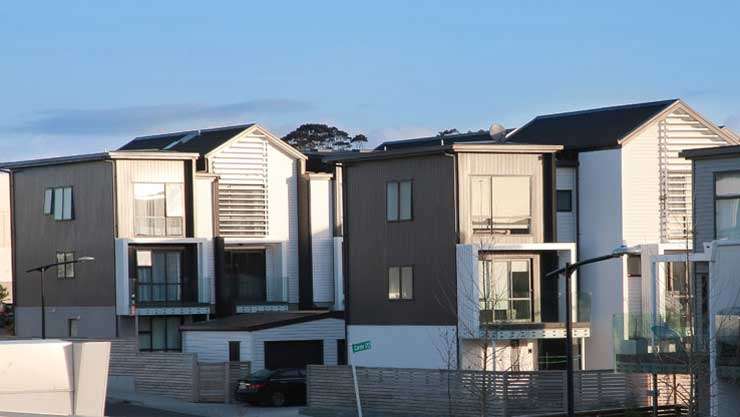Auckland’s most at-risk homeowners have been identified in new research by OneRoof’s data partner, Valocity.
Suburbs with the greater number of recent purchases and lowest amount equity growth were most at risk if the market softens, the research suggests.
Valocity analysed how much equity Auckland purchasers had built up between 2016, the last market peak, and October 2021 to try and determine what suburbs within the city could withstand a slowdown in the housing market.
James Wilson, Valocity director of valuations, said the average value gain for Auckland properties bought between January 2016 and January 2020 was 43%, mostly as result of the post-Covid housing market surge.
Start your property search
The average value gain for properties bought in 2020 was 30%, while the gain for properties bought between January and October last year was 16%.
"Aucklanders who bought before 2020 would most likely be able to weather a housing market upset, with those who bought in the last year more prone to price fluctuations.”
Covid-19’s negative impact
However, the Valocity research found that some suburbs were more exposed than others. Central city suburbs dominated by apartments and townhouses saw the lowest amount of value growth over the past five years - well below the city-wide average of 38%.
The average property value in Auckland CBD grew just 17% since 2016, while the average property value in neighbouring Newmarket, Grafton and Eden Terrace rose 22%, 23% and 24% respectively. Growth in Long Bay, Manukau and Fairview Heights - suburbs also dominated by apartments - was between 25% and 26%.

Auckland’s Hobsonville Point. Homeowners who bought in the mast-planned suburb in the last 12 months could lose out if the market softens. Photo / New Zealand Herald
"Since 2016, the key driver of value growth in Auckland property has been land, in terms of its size and development potential. Homes with little or no exclusive land area have lagged behind the rest of Auckland. There have also been other drivers which have had negative impacts on demand within some of these submarkets, such as the impact of Covid-19 and the international travel ban on the demand for CBD apartment stock, typically favoured by international students," Wilson said.
Wilson said that value growth did not tell the whole story. Low-growth suburbs that have seen a high volume of sales in 2021 are potentially more at risk from market upsets.
The research found that the suburbs least prepared to withstand a price shock are those dominated by new large-scale developments.
"Albany Heights, Silverdale, Long Bay, Hobsonville and Takanini are most at risk because they have seen a large number of sales in 2021 but little in the way of value growth. These suburbs also have many new developments proposed or underway, so oversupply will further dampen any future price growth.
"Also falling into the same trap are Kumeu, Huapai, Wainui, Flat Bush and Papakura."
Advice for homeowners under pressure
When homeowners lose their job or a business and can’t recover their earning power, they may be forced to sell. Banks have a lot of options to help, such as allowing homeowners in crisis to go interest-only for a period, says mortgage broker Jeff Royle, but that’s providing homeowners don’t stick their heads in the sand.
What’s more, some homeowners squander equity. New Zealanders like to borrow against so-called “spare equity” in a home to pay for lifestyle spending such as travel, home upgrades, a new car or simply paying down general consumer debt. Put simply, they use the equity in their home as a piggy bank.

James Wilson, Valocity head of valuations: "Since 2016, the key driver of value growth in Auckland property has been land." Photo / Supplied
Royle says that thanks to the 2015 Responsible Lending Code and the tightening of the Credit Contract and Consumer Finance Act, banks aren’t doling out money anywhere nearly as freely as they used to. “There's far less of that reaching for the piggy bank than 10 years ago,” he says.
“If somebody has refinanced two years ago, and cleared $50,000 worth of debt, and they go back to the bank and want the same thing again, the banks are likely to say no. It’s partly an attitude change but it’s also partly driven by regulatory forces.”
That’s not to say it’s not happening. In the three months to the end of October last year, nearly 30% of the more than 30,000 new mortgage registrations in New Zealand were for refinancing and top-ups, says Wilson. That’s more than double the number of mortgages taken out when existing homeowners move house - 4011 in those three months. “We've probably seen a lot of [top-up] activity,” says Wilson.
New Zealanders can find themselves in trouble with the mortgage if they lose their job or business. Royle notes that 9500 businesses closed in October. “I don't think we've seen anywhere like the end of that. There's a lot more to come. But also, the employees of those businesses are going to be affected as well. I think we are going to see an increase in people under financial stress.
“It doesn't matter whether you have $1 million equity in your house or you bought at the peak of the market, if the market has fallen by 15% - which it won't - you've actually got no equity in the property. That happened in the GFC and people kept paying their mortgages. Two years later, they had their equity back.”
He adds: “As an adviser I refer all clients to an insurance expert who recommends taking out mortgage protection insurance.”

















































































